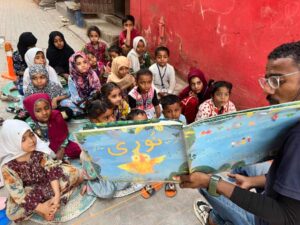
Pedalling down a narrow alleyway in Karachi’s crowded Lyari Town, Saira Bano slows as she passes a group of children sitting on the ground, listening to a man reading aloud from a book. The eight-year-old gets off her bike, slips off her sandals, and sits on the mat at the back.
She has already heard the story from Mohammad Noman, who is entertaining more than a dozen children with the tale of Noori, an insecure yellow parrot. “I don’t mind listening to it again,” says Saira. “He’s so funny.”
Noman, 23, is spending two weeks in Lyari pedalling an old ice-cream cart through its lanes, stopping to read his stories and leaving behind books for the children to borrow.
He dropped out of school himself as a teenager but has returned to education and is now studying for his high school certificate.
He is also one of two storytellers working part-time for the Kahaani Sawaari (Stories on Wheels) programme, run by GoRead.pk, which is working to improve literacy among underprivileged communities in Karachi, Pakistan’s largest city.
“I become a kid when I am around the children,” says Noman. In the past 18 months, he has visited 30 areas of Lyari, one of the most densely populated and deprived neighbourhoods of Karachi, with more than 660,000 residents, mostly from the marginalised Baloch ethnic group.
“I have learned so much,” says Noman. “It has brought a change in me as well. I’ve become more tolerant of people and developed patience. I think I have a certain rapport with children and they listen.”
Education is free and compulsory in Pakistan yet, according to the UN, it has the world’s second-highest rate of children absent from school, at 44% of five to 16-year-olds. And 77% of 10-year-olds are unable to understand simple text, according to the World Bank.
Books and uniforms can be prohibitively expensive in Pakistan. Saira dropped out of school a year ago when her father, who worked in a toy shop, lost his job as Pakistan’s economy was hit by rocketing food and fuel prices.
